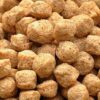Managing Diabetes with Millets: A Nutrient-Packed Solution
Managing Diabetes with Millets: A Nutrient-Packed Solution
Introduction
Diabetes is a prevalent health condition that affects millions of people worldwide. While medication and lifestyle modifications play a crucial role in managing diabetes, diet also plays a significant part in controlling blood sugar levels. One dietary approach that has gained attention for its potential benefits in diabetes management is the incorporation of millets. In this blog post, we will explore how millets can be a valuable addition to a diabetic-friendly diet.
Understanding Diabetes
Before diving into the role of millets, it’s essential to understand diabetes. Diabetes mellitus is a chronic metabolic disorder characterized by elevated blood sugar levels, primarily caused by insulin resistance or inadequate insulin production. Properly managing diabetes involves controlling blood sugar levels to prevent complications and lead a healthy life.
Millets: A Nutritional Powerhouse
Millets are a group of small-seeded grasses that have been cultivated for thousands of years. They have recently gained popularity due to their impressive nutritional profile and potential health benefits. Some common types of millets include finger millet (ragi), pearl millet (bajra), foxtail millet, and sorghum (jowar). Here’s why millets are a great addition to a diabetic diet:
- Low Glycemic Index (GI): The glycemic index measures how quickly carbohydrates in a food item raise blood sugar levels. Millets have a low GI, which means they cause a gradual and steady increase in blood sugar levels, making them suitable for people with diabetes.
- Rich in Fiber: Millets are an excellent source of dietary fiber, which helps regulate blood sugar levels. Fiber slows down the digestion and absorption of carbohydrates, preventing rapid spikes in blood sugar after meals.
- Nutrient-Dense: Millets are packed with essential nutrients such as vitamins (B-complex vitamins and vitamin K), minerals (iron, magnesium, and phosphorus), and antioxidants. These nutrients contribute to overall health and help manage diabetes-related complications.
- Gluten-Free: Millets are naturally gluten-free, making them a safe option for those with celiac disease or gluten sensitivity, conditions that sometimes coexist with diabetes.
Benefits of Millets for Diabetics
Now that you understand the benefits of millets for diabetes management, here are some ways to incorporate them into your diet:
- Blood Sugar Control: The slow-release carbohydrates in millets help stabilize blood sugar levels, reducing the risk of sudden spikes and crashes.
- Weight Management: The fiber content in millets promotes a feeling of fullness, aiding in weight management, which is essential for diabetes control.
- Heart Health: Millets are known to support heart health by lowering cholesterol levels and reducing the risk of heart disease, which is a common complication of diabetes.
- Improved Digestion: The fiber in millets can alleviate digestive issues often associated with diabetes, such as constipation.
Incorporating Millets into Your Diet
Now that you understand the benefits of millets for diabetes management, here are some ways to incorporate them into your diet:
- Millet Porridge: Replace your regular breakfast cereal with millet porridge. It’s easy to make and can be flavored with fruits, nuts, and a touch of honey or cinnamon.
- Millet Flour: Use millet flour to make rotis or gluten-free flatbreads. These can be paired with diabetic-friendly vegetable curries or lean protein sources.
- Millet Salad: Prepare a colorful salad with cooked millets, vegetables, and a light vinaigrette dressing for a nutritious and satisfying meal.
- Millet Snacks: Make snacks like millet-based puffed snacks or baked goods using millet flour for healthier alternatives to traditional snacks.
Conclusion
Millets are a versatile and nutritious addition to a diabetic diet. Their low glycemic index, high fiber content, and wealth of essential nutrients make them a valuable tool in managing blood sugar levels and preventing diabetes-related complications. However, it’s crucial to consult with a healthcare provider or a registered dietitian before making significant dietary changes, as individual dietary needs may vary. With proper guidance, you can embrace the benefits of millets and take a step towards better diabetes management and overall health.








